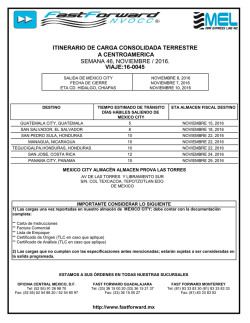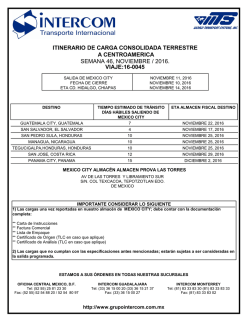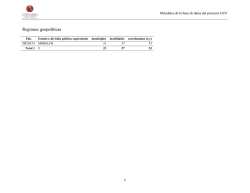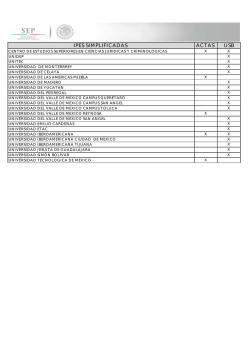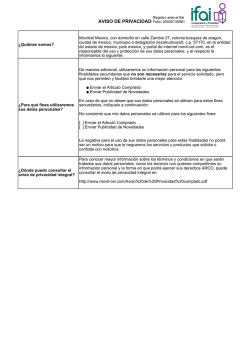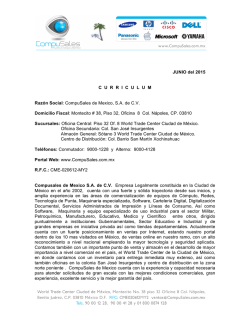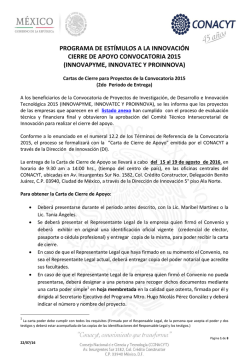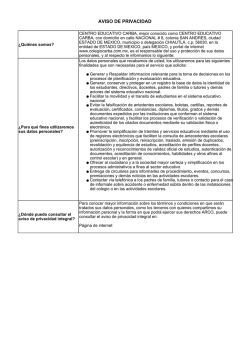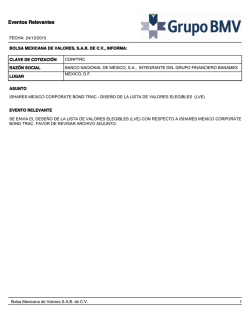
CV - AMOR MUNOZ STUDIO
Amor Muñoz Artist / Mexico [email protected] +52 1 55 13 55 8654 www.amormunoz.net @amormunozm AMOR MUÑOZ Mexico city, 1979. AWARDS & GRANTS GROUP EXHIBITIONS - Bauhaus. Artist Residency Award. Dessau, Germany, 2017. 2016 - Nordic Artists' Centre Dale. Artist Residency Award. Norway, 2016. SWAB Barcelona. Solo Swab Program. Italian Pavilion. Barcelona, Spain. - Kultur Kontak. Artist Residency Award. Vienna, Austria, 2015. The Ibero-American Biennial of Design (BID). Matadero Madrid. Spain. - Sistema Nacional de Creadores de Arte ( National System of Art Creators) 2015 Grant. Mexico, 2015. - Transcultural Emancipation 2. Public Art Fluc. Vienna Art Week. - Works by Artists in Residence Kultur Kontakt: Presentation 4/2015. Austrian Federal Chancellery. Vienna. 2014 - New Face Award / 17th JAPAN MEDIA ARTS FESTIVAL. 2013 - Prize “Mentes Quo+Discovery 2013”, Quo Magazine and Discovery Channel, Mexico 2013. - Honorary Mention / PRIX ARS ELECTRONICA 2012 - Nordic Artists' Centre Dale. Artist Residency Award. Norway.2014. - BBVA Bancomer Foundation Grant, 2012. - Fondo Nacional para la Cultura y las Artes, Mexico. Fellowship for Young Creators (2010-1012). - Grant for Investigation and Production in Arts and New Media of Centro Multimedia. Mexico, 2010. - Fondo Nacional para la Cultura y las Artes, Mexico. Fellowship for Young Creators (2007-2008). SOLO EXHIBITIONS AND PRESENTATIONS. 2016 (O)bservatory. Nordic Artists' Centre Dale. Norway. 2015 Rhythmic Manufacture. 21er Haus, Belvedere. Viena. 2011 ESQUEMÁTICOS. Laboratorio Arte Alameda. Mexico City. 2010 Rs, Simulació n y Espacio. Casa Vecina & Lugar Cero. Mexico City. 2009 TRRA_3D>R4. Taller Gráfica Actual, Oaxaca, Mexico. 2008 SENTI MENTAL BESTIARY. Fingered gallery, Arts in Bushwick Festival, New York City. - BESTIARIO SENTIMENTAL. Centro Cultural BORDER. Mexico city. - DIGITAL LATIN AMERICA. 516 Arts. Albuquerque, New Mexico, USA. - JAPAN MEDIA ARTS FESTIVAL. National Art Center, Tokyo. Japan. - Open Studio. Nordic Artists' Centre. Norway. - Open Lab. CAC4 + Hiper5. Universidade Federal do Rio de Janeiro. Brazil. - Capital Orgánico. Galería de Arte del Palacio Municipal. Puebla. Mexico. 2013 - ESTO NO ES UN MUSEO, Artefactos mó viles al acecho. Centro Cultural España, Mexico city. 2012 - CYBERARTS 2012. Ars Electronica. OK CENTER. Linz, Austria. - Memografı́as. Museo Nacional de la Estampa. Mexico City. - MUESTRA DEL PROGRAMA DE APOYOS A LA PRODUCCIÓN E INVESTIGACIÓN EN ARTE Y MEDIOS. Centro Multimedia. CNA. Mexico city. - ESTO NO ES UN MUSEO, Artefactos mó viles al acecho. ACVic Centre d’Arts Contemporànies. Barcelona, Spain. 2011 - CONDUCTORES: Galia Eibenschutz and Amor Muñoz. Rubin Center, University of Texas, El Paso, Texas. USA. - ELECTRONIKA- VIVO ARTE.MOV. Festival De Novas Tendências. Palá cio das Artes, Belo Horozonte. Brazil. - TRANSITIO MX, International Festival on Electronic Arts and Video. Mexico City. 2010 - TRANSFRONTERAS CONTEMPORANEAS, America Latina Memorial. São Paulo, Brazil. - DRAW, Museo de la Ciudad de Mé xico. Mexico city. - MAQUILA R4 / Public space action. OMR Gallery. Mexico City. 2009 - TRUE SELF. Jonathan LeVine Gallery. New York City. PUBLICACIONES / PUBLICATIONS - EYEO Converge to inspire 2011-2015. EyeO Festival. USA, 2015. -Digital Latin American. Radius books. 516 Arts & UNM Art Museum. USA, 2014. -17th Japan Media Arts Festival Book. Japan, 2014. - New York Times A Factory on Bicycle Wheels, Carrying Hope of a Better Life.Demian Cave, 31 December 2012. - CyberArts 2012 Book. Prix Ars Electronica Linz, Austria. - Roulotte:09 This is not a museum. Mobile devices lurking Associació per a la cultura i l Art Contemporani Bacelona, España. 2011. - ART PULSE, International Contemporary Art. Esquemá ticos: Amor Muñoz. Winter 2011-12 - Electronika, Festival de Novas Tendências Catalog. Brasil, 2011. - Transitio_Mx 04 International Festival on Electronic Arts and Video Catalog. Mexico. 2011. - Lugar_Cero, Book. Polyphonic reflection about art and the city Mexico. 2012 SCHEMATICS 2011 #ElectronicTextiles #Embroidery #ConductiveThread #InteractiveFabric #ExpandedDrawings #SoundPieces Esquemáticos is a series of works that link hand-made embroidering with the symbolic representation of analogue circuit diagrams. The project is an exhibition of large schematic drawings that have been hand-sewn with a conductive thread and electronic components, so that the circuits are full functional machines that can be operated by the public. There are 5 sound pieces, each measuring 300 x 150 cm: I) A 555 integrated circuit creates sound oscillations in response to the public's drawings with graphite pencils II) An electronic organ has 8 push-buttons that correspond to the musical scale. II) A heart-rate sensor activates an LED light and a loudspeaker to the rhythm of the pulse of the participant. IV) An audio sensor connected to a relay that turns on an old radio or a turntable. V) A breathalyzer measures the alcohol level in the breath of the participant and converts it to an ambulance siren (tequila is optionally provided to help the public activate the work). These pieces are accompanied by several projections on worktables, showing the process of creation of the works.BThis project attempts to overlay the abstraction of technical drawings withBfunctional technology, creating formal and procedural connections between them. We seek to couple the slow task of embroidering, --surrounded by stereotypes of gender, class, craft and cheap labour-- with the low-tech aesthetic of old-school analogical circuits and electronic components. Video: https://vimeo.com/39606276 Second version #Empowerment #LowHighTech #Art&Society #NeoHandcraft "But the utilitarian component I seek is not focused to make something that is useful more beautiful, but on the contrary, it’s focus on the beauty of its utility. Observe the investigation of the concept and its potential use as an aesthetic element.” - Tania Bruguera (About Useful Art). Yuca_tech: Energy by hand is an art project of social content, which seeks to create community work to solve local problems, using low and high tech resources, juxtaposing tradition and innovation with appropriate technology. Yuca-Tech focuses on the development of alternative forms of production through collaboration with women crafters in a small village located in the Yucatan henequen zone (a Maya region). Yuca-Tech is designed as a community technology lab that involves the creation of artistic/technological pieces that combine indigenous crafting techniques (weavings of agave fibers), with open-source technologies and new materials. For the artist it is important the idea that people learn to make their own technology because this generate a bond of affection between people and technological object. Some of the manufactured objects are solar textile panels, everyday objects with solar powered LED light (hats, sandals) and some solar bags designed to store electricity, that have been tested by some street vendors, that sell energy for 5 peso a minute to passerby needing to charge their cellular phones. YUCA_TECH: ENERGY BY HAND 2015 #ElectronicTextiles #DIY #RelationalArt #WearableTechnology #Empowerment #LowHighTech #Art&Society #NeoHandcraft "But the utilitarian component I seek is not focused to make something that is useful more beautiful, but on the contrary, it’s focus on the beauty of its utility. Observe the investigation of the concept and its potential use as an aesthetic element.” - Tania Bruguera (About Useful Art). Yuca_tech: Energy by hand is an art project of social content, which seeks to create community work to solve local problems, using low and high tech resources, juxtaposing tradition and innovation with appropriate technology. Yuca_Tech is a laboratory focused in community technology, located in the henequen manufacturing area of Yucatan, whose aim is to create a series of artistic/technological pieces like photovoltaic textile artifacts and some pieces with light using tecnological materials and traditional fibers within a craft process. Its Important that the final pieces work with solar energy and represent an improvement in the life of the community. Testing a big textile solar panel, 2015. Natural fiber (henequén), conductive thread, flexible solar cells, diode. My daily objects light my life: Hat, conductive thread , LEDs and rechargeable battery 2015 My daily objects light my life: Sandals, LEDs, conductive thread and rechargeable battery. 2015 Selling energy by hand: Recharge your cell phone MAQUILA REGION 4 2010-2013 #Manufacture #ElectronicTextiles #Performance #Art&Technology #ProductionSystems #Manufacture #SocialEmpowerment MR4 is a performative intervention in the labour landscape of marginal areas of Mexico. For the MR4 project, "Maquilas" are re-imagined in the tradition of critical work by Fusco, Barrios, Arce, Werthein and other artist-activists. Maquilas are border town factories in which Mexico provides raw materials and cheap labour, mostly women, and the US provides management and ownership. MR4 is a mobile factory for the manufacture of electronic-textile artworks. This nomadic workshop travels to poor areas of Mexico offering American minimum wage ($8.00 per hour, compared to $0.60 per hour in Mexico). People are hired to produce fully functional electronic circuits using conductive thread. Maquilas' two main products, textiles and electronics, are mixed by the MR4 project, using sowing and embroidery which are common aptitudes among people in these marginal areas. The actual textile-schematic circuits produced are alarms which ring with different tones when a proximity sensor is activated. Once a piece is finished, the worker embroiders on it a unique BiDi code (similar to a QR Code). As the BiDi is decoded, typically by a consumer with a smart phone, a web page appears which renders visibility to the process of production: name of the worker, location, date and duration of the work session and salary received Video: https://vimeo.com/48021362 . Rhythmic Manufacture Performance - drawing - installation 2015 #TechnologicalObsolescence #TechnicalDrawing #ProductionSystems #ArtTechnology&Society #Labor #Performance Rhythmic manufacture is a performance (daily action), that use the drawing and technological imaginaries as support trying to be as a machine, conditioning the body and brain to a mechanical work, to a repetitive corporal pattern timed and marked by a rhythm with a metronome. During a week, 8 hours per day in an open space, the artist (factory worker) draws a series of electronic components, transforming the real, three-dimensional and functional object, to a simple representation, without dimension and function, as a metaphor of the exponential obsolescence of objects today. Video: https://vimeo.com/152084545 0 / 1: An Archeology of Technological Artifact 2016 #TechnologicalObsolescence #ExpandedField #ElectronicDrawings #Old&NewTechnologies #digital manufacturing I) Data Processing Data Processing is a series (10 diferent pieces) of electronic screen prints with images of ancient stones containing information of astronomical or mathematical calculations. The pieces are connected to electricity and activate a flashing LEDs box simulating a digital data processing. The antique Data processed by a contemporary medium. Video / example of functionality: https://vimeo.com/172905172 0 / 1: An Archeology of Technological Artifact 2016 #TechnologicalObsolescence #ExpandedField #CutLaser #digital manufacturing #ElectronicDrawings #Old&NewTechnologies II) The shadows of obsolescence Is a series of 7 large felt pieces cut laser, with form of technological devices that begin to disappear or become obsolete. The pieces are large Format (250 cm) Otras piezas WEARABLE SOUNDSCAPE 2014 Arduino MP3, acelerómetro, xbee, bocinas textiles e hilo conductivo. Este dispositivo wearable es un paisaje sonoro que mediante movimientos (usando un acelerómetro) activa diferentes sonidos recolectados de movimiento y sonido controlan la proyección de paisajes en video. Stills SOLARIS: El hilo dorado_ energía solar 2013 Gráfica Textil/ Páneles solares textiles Tríptico 90x70 cm c/u "Las estrellas que rodean la esfera etérica no se hicieron visibles hasta después de la creación del sol, ya que acumulan la luz del astro rey" Rs: Simulación y espacio Acción sonora en espacio público 2009 #ArtSociety&Technology #PublicSpace #DIY #Memory #Mexico85 #SoundAction In memoria - Terremoto del 85, Ciudad de México. “Rs= (P,V,D) Simulación y espacio" propone una aproximación a los riesgos naturales, concretamente sísmicos, que dentro del contexto urbano, necesariamente abren preguntas sobre la organización social, la prevención y la protección. Para esto, la artista ha diseñado un dispositivo móvil cuyo traslado activa en su interior un mecanismo de alarmas sísmicas: el movimiento genera las simulaciones repetidas en pequeña escala de un temblor, activando el sonido de 5 sirenas (en este caso, de menor intensidad) dentro del módulo descrito. La exploración de la sutil línea entre el estado de alerta y el estado de alarma se complementa con un instructivo para el público sobre cómo elaborar una alarma casera. El título del gesto corresponde a la ecuación utilizada para calcular el riesgo sísmico en función de tres factores: peligro, vulnerabilidad y daño; mientras, la simulación artística se concreta en el espacio del Centro Histórico, una de las zonas más vulnerables del país en caso de un sismo, debido a la gran cantidad de edificios calificados de "alto riesgo". "Rs= (P,V,D) Simulación y espacio" también es una remembranza del terremoto de 1985 y de sus consecuencias. Video: https://vimeo.com/152084545 JOULE (W) / Fuerza y trabajo 2014 Joule: Fuerza y Trabajo es un proyecto de instalación que reflexiona entorno a los sistemas de producción. El nodo central es la fuerza de trabajo vista como la capacidad del hombre para trabajar y el conjunto de fuerzas físicas y espirituales de que el hombre dispone y que utiliza en el proceso de producción de los bienes materiales. La fuerza de trabajo es la condición fundamental de la producción en toda sociedad. Joule se conforma de una serie de piezas textiles de gran formato. Por un lado, tres patrones de costura trazados en código morse, los cuales tienen encriptadas frases relacionadas al trabajo y a la mano de obra. Estas piezas textiles son a la vez sonoras, las cuales transmiten al espectador sonidos de una planta de ensamble automotriz. Por otro lado, tenemos la confección de un overol de trabajador de 10 metros que busca hacer patente la figura del trabajador, esa pieza normalmente ignorada y sin rostro en la cadena de producción. *Joule: Unidad del Sistema Internacional de Unidades para energía en forma de calor (Q) y trabajo (W). Citas encriptadas en los patrones con Código Morse. El cerebro del patrón se encuentra bajo la gorra del obrero. Montgomery. No hay gente tonta, sólo hay oficios tontos. A. Tanner Resulta sumamente ventajoso hacer que los mecanismos funcionen infatigablemente, reduciendo al mínimo posible los intervalos de reposo: la perfección en la materia sería trabajar siempre. Barón Dupon, Informe a la cámara de parís, 1847. Las primeras de estas reglas conciernen a la utilización del cuerpo humano; siempre que se pueda, se recomienda recurrir al trabajo bimensual, simétrico con relación al plano axial del cuerpo, siendo simultáneos los movimientos de uno y otro brazo. G. Lubert Joule (w) 2014 Acción en espacio público Monumento a la Revolución, Ciudad de México. TRRA_3D>R4 2010 TRRA fue un projecto realizado en mi residencia artistica en Oaxaca. Inició con una pieza a muro y una obra gráfica en papel. He continuado el proyecto con más piezas a muro, buscando lúdicas posibilidades de la expansión de la gráfica. A partir de un patrón (Mapa de la República Mexicana de cabeza), hago un ejercicio de multiplicidad para obtener, cientos de mapas en fieltro. Estos en conjunto dan forma a una serie composiciones abstractas, que remiten a relieves orográficos. Esta unidad abstracta es compuesta por tierras diminutas. La República Mexicana de cabeza es una clara crítica y referencia política. Es una reflexión sobre roll que tiene la illusión en la política. Cómo un factor de multiplicidad es planteado como una idea de progreso. Multiplicidad y expansión día a día van gestando un impacto terrirorial, ambiental y social. Casos específico son el fenómeno de la costrucción de colonias en los cerros de la ciudad por sobrepoblación y los proyectos de habitación Casas GEO. Con el 3D se pretende hacer un juego visual y conceptual, crear esa ilusión. Finalmente el 3D es un efecto óptico, es un engaño al cerebro mediente la visión. *TRRA= tierra, 3D = tercera dimensión y R4 =Región cuatro (3er mundo)
© Copyright 2026
